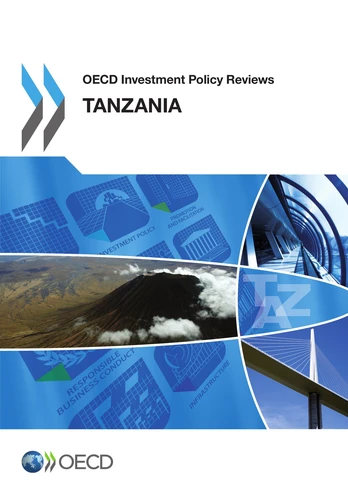Tanzania 2013 - oecd investment policy reviews
Par :Formats :
Disponible dans votre compte client Decitre ou Furet du Nord dès validation de votre commande. Le format PDF est :
- Compatible avec une lecture sur My Vivlio (smartphone, tablette, ordinateur)
- Compatible avec une lecture sur liseuses Vivlio
- Pour les liseuses autres que Vivlio, vous devez utiliser le logiciel Adobe Digital Edition. Non compatible avec la lecture sur les liseuses Kindle, Remarkable et Sony
 , qui est-ce ?
, qui est-ce ?Notre partenaire de plateforme de lecture numérique où vous retrouverez l'ensemble de vos ebooks gratuitement
Pour en savoir plus sur nos ebooks, consultez notre aide en ligne ici
- Nombre de pages225
- FormatPDF
- ISBN978-92-64-20434-8
- EAN9789264204348
- Date de parution23/12/2013
- Copier Coller01 page(s) autorisée(s)
- Protection num.Digital Watermarking
- Taille12 Mo
- Transferts max.Autorisé
- Infos supplémentairesPDF avec Watermark
- ÉditeurOECD
Résumé
This review of investment policy in Tanzania evaluates the current policy situation and makes recommendations for enabling Tanzania to attract higher investment to exploit its full potential and become a regional trade and investment hub. The review finds that while private investment in Tanzania has considerably risen since the early 1990s, further progress can be made to improve the business climate and attract more investment in key sectors, such as infrastructure and agriculture.
Informed by the subsequent chapters of this report, this overview provides policy options to address these challenges.
In particular, investors' rights and obligations could be rationalised and made more accessible and regulations on foreign investment and investment incentives reviewed. The land legislation could be revised and land rights registration accelerated, notably by providing stronger incentives for registration. The short-term and long-term costs and benefits of the regulatory restrictions imposed by crop boards and of export bans could be closely analysed.
In particular, investors' rights and obligations could be rationalised and made more accessible and regulations on foreign investment and investment incentives reviewed. The land legislation could be revised and land rights registration accelerated, notably by providing stronger incentives for registration. The short-term and long-term costs and benefits of the regulatory restrictions imposed by crop boards and of export bans could be closely analysed.
This review of investment policy in Tanzania evaluates the current policy situation and makes recommendations for enabling Tanzania to attract higher investment to exploit its full potential and become a regional trade and investment hub. The review finds that while private investment in Tanzania has considerably risen since the early 1990s, further progress can be made to improve the business climate and attract more investment in key sectors, such as infrastructure and agriculture.
Informed by the subsequent chapters of this report, this overview provides policy options to address these challenges.
In particular, investors' rights and obligations could be rationalised and made more accessible and regulations on foreign investment and investment incentives reviewed. The land legislation could be revised and land rights registration accelerated, notably by providing stronger incentives for registration. The short-term and long-term costs and benefits of the regulatory restrictions imposed by crop boards and of export bans could be closely analysed.
In particular, investors' rights and obligations could be rationalised and made more accessible and regulations on foreign investment and investment incentives reviewed. The land legislation could be revised and land rights registration accelerated, notably by providing stronger incentives for registration. The short-term and long-term costs and benefits of the regulatory restrictions imposed by crop boards and of export bans could be closely analysed.























